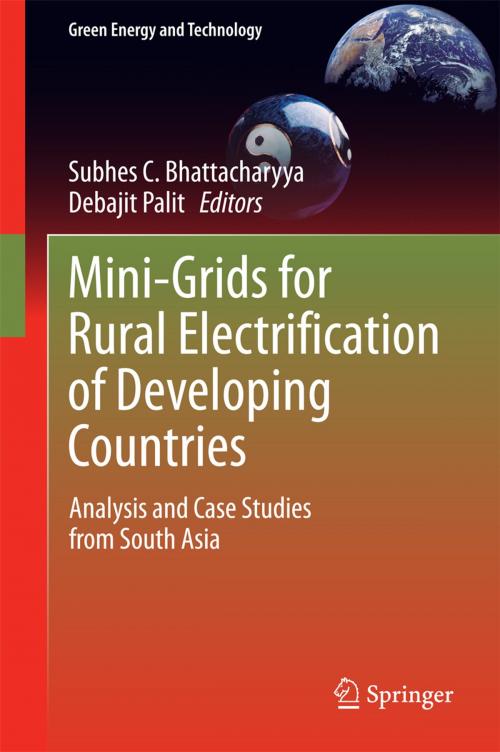Mini-Grids for Rural Electrification of Developing Countries
Analysis and Case Studies from South Asia
Nonfiction, Science & Nature, Technology, Machinery, Power Resources| Author: | ISBN: | 9783319048161 | |
| Publisher: | Springer International Publishing | Publication: | May 31, 2014 |
| Imprint: | Springer | Language: | English |
| Author: | |
| ISBN: | 9783319048161 |
| Publisher: | Springer International Publishing |
| Publication: | May 31, 2014 |
| Imprint: | Springer |
| Language: | English |
In recognition of the fact that billions of people in the developing world do not have access to clean energies, the United Nations launched the Sustainable Energy for All Initiative to achieve universal energy access by 2030. Although electricity grid extension remains the most prevalent way of providing access, it is now recognized that the central grid is unlikely to reach many remote areas in the near future. At the same time, individual solutions like solar home systems tend to provide very limited services to consumers. Mini-grids offer an alternative by combining the benefits of a grid-based solution with the potential for harnessing renewable energies at the local level. The purpose of this book is to provide in-depth coverage of the use of mini-grids for rural electrification in developing countries, taking into account the technical, economic, environmental and governance dimensions and presenting case studies from South Asia.
This book reports on research carried out by a consortium of British and Indian researchers on off-grid electrification in South Asia. It provides state-of-the art technical knowledge on mini-grids and micro-grids including renewable energy integration (or green mini-grids), smart systems for integration with the central grid, and standardization of systems. It also presents essential analytical frameworks and approaches that can be used to analyze the mini-grids comprehensively including their techno-economic aspects, financial viability and regulatory issues. The case studies drawn from South Asia demonstrate the application of the framework and showcase various successful efforts to promote mini-grids in the region. It also reports on the design and implementation of a demonstration project carried out by the team in a cluster of villages in Odisha (India).
The book’s multi-disciplinary approach facilitates understanding of the relevant practical dimensions of mini-grid systems, such as demand creation (through interventions in livelihood generation and value chain development), financing, regulation, and smart system design. Its state-of-the art knowledge, integrated methodological framework, simulation exercises and real-life case analysis will allow the reader to analyze and appreciate the mini-grid-related activities in their entirety. The book will be of interest to researchers, graduate students, practitioners and policy makers working in the area of rural electrification in developing countries.
In recognition of the fact that billions of people in the developing world do not have access to clean energies, the United Nations launched the Sustainable Energy for All Initiative to achieve universal energy access by 2030. Although electricity grid extension remains the most prevalent way of providing access, it is now recognized that the central grid is unlikely to reach many remote areas in the near future. At the same time, individual solutions like solar home systems tend to provide very limited services to consumers. Mini-grids offer an alternative by combining the benefits of a grid-based solution with the potential for harnessing renewable energies at the local level. The purpose of this book is to provide in-depth coverage of the use of mini-grids for rural electrification in developing countries, taking into account the technical, economic, environmental and governance dimensions and presenting case studies from South Asia.
This book reports on research carried out by a consortium of British and Indian researchers on off-grid electrification in South Asia. It provides state-of-the art technical knowledge on mini-grids and micro-grids including renewable energy integration (or green mini-grids), smart systems for integration with the central grid, and standardization of systems. It also presents essential analytical frameworks and approaches that can be used to analyze the mini-grids comprehensively including their techno-economic aspects, financial viability and regulatory issues. The case studies drawn from South Asia demonstrate the application of the framework and showcase various successful efforts to promote mini-grids in the region. It also reports on the design and implementation of a demonstration project carried out by the team in a cluster of villages in Odisha (India).
The book’s multi-disciplinary approach facilitates understanding of the relevant practical dimensions of mini-grid systems, such as demand creation (through interventions in livelihood generation and value chain development), financing, regulation, and smart system design. Its state-of-the art knowledge, integrated methodological framework, simulation exercises and real-life case analysis will allow the reader to analyze and appreciate the mini-grid-related activities in their entirety. The book will be of interest to researchers, graduate students, practitioners and policy makers working in the area of rural electrification in developing countries.















